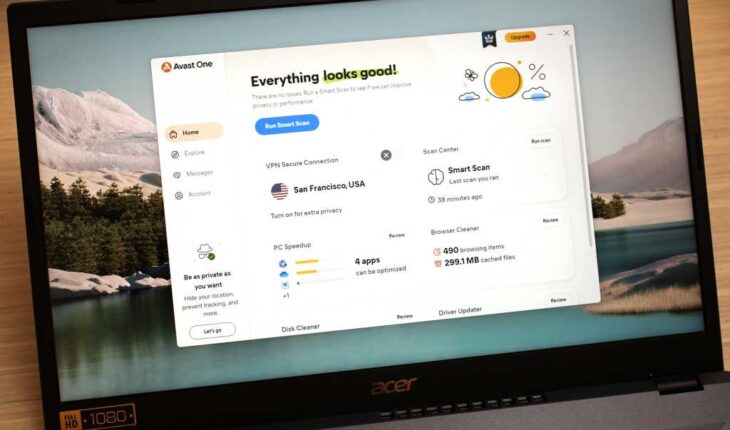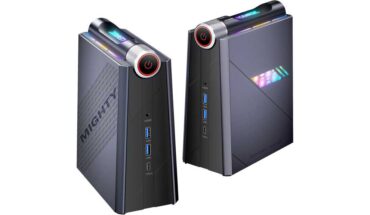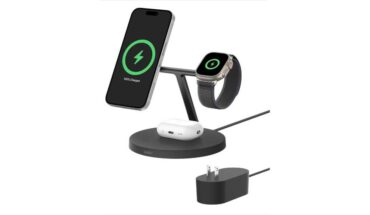Expert’s Rating
Pros
- Clean, uncluttered interface
- Excellent antivirus protection
- Well-priced for its feature set
Cons
- Full scans affect PC performance when using Microsoft Office apps
- No included password manager
Our Verdict
Avast One expands upon the company’s free security suite, with upgraded defenses against online threats and additional features. You don’t get just excellent antivirus protection, but tools to safeguard your identity and privacy (including a VPN with unlimited bandwidth), as well as tune up your PC. While it lacks a password manager and parental controls, if you’re all set on those fronts, this app’s polish is hard to beat.
Price When Reviewed
This value will show the geolocated pricing text for product undefined
Best Pricing Today
Price When Reviewed
$53.88 / 5 devices I $83.88 / 30 devices
Best Prices Today: Avast One
You could let Windows protect your PC — it does already shield against online threats. But independent antivirus software like Avast One is better at catching viruses and malware, and wins on user friendliness, too.
Avast actually has two lines of paid products, both powered by the same antivirus engine. They have similarly clean interfaces, too. But the Avast One line focuses on identity and privacy concerns, making it arguably the better choice for most people. Life is largely conducted online these days, and staying safe is more than just thwarting malware and exploits. Phishing schemes and personal information leaked in data breaches can weaken your security, too.
Avast One lets you stay on top of these issues, which are currently unavoidable in modern life, and does so with polish.
Further reading: See our roundup of the best antivirus software for Windows to learn about competing products.
What does Avast One include?
Avast One enhances the already wide protection against online threats available in the free Essentials plan — it both upgrades existing defenses and adds new ones to the set, too.
The fundamentals include the company’s top-notch antivirus and firewall, which block malware, ransomware, malicious websites and downloads, and network intrusions. The suite also monitors for vulnerable networks, compromised applications, attempts at unauthorized access to the saved passwords in your browser, and appearances of your data on the dark web. And you get PC utilities, too: a system optimizer and software updater.
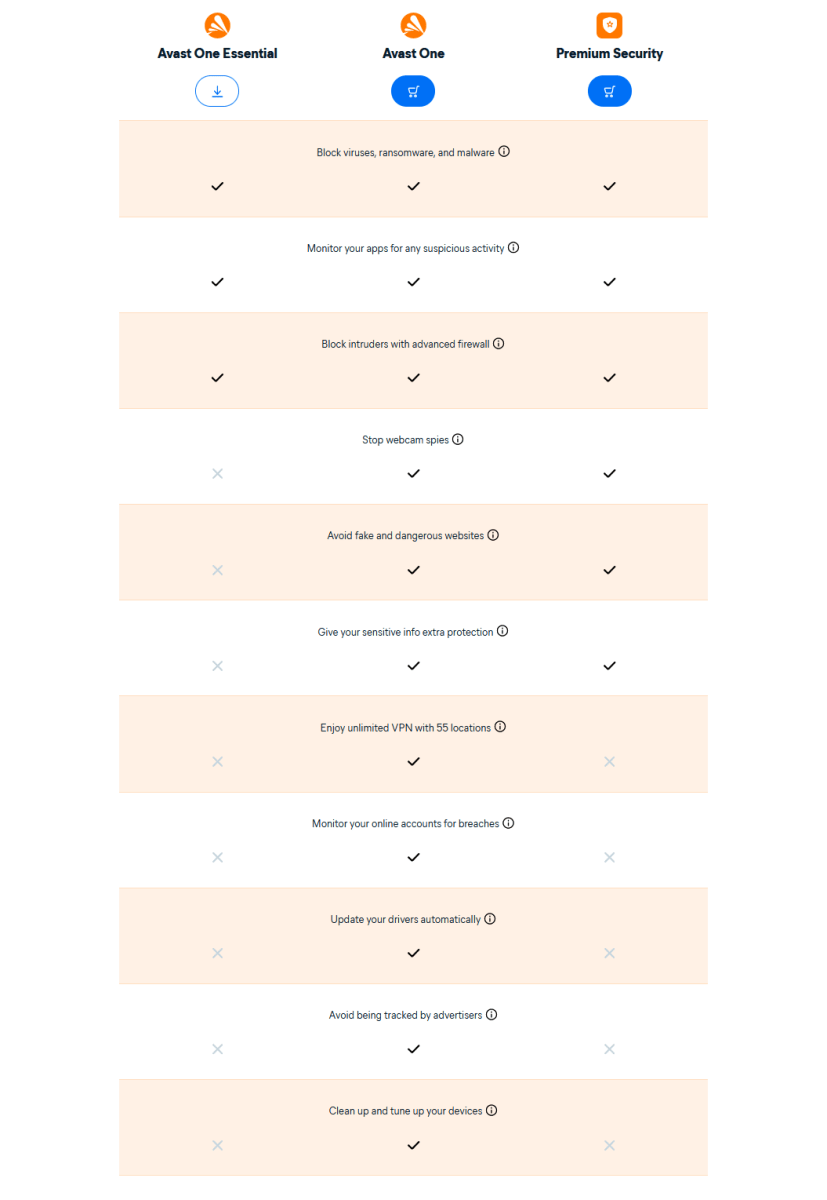
PCWorld
Upgrading to Avast One unlocks safeguards against dangers like webcam takeovers; webmail messages containing malware and phishing attempts; shady apps hunting for sensitive data (like social security numbers) on your PC; and malicious redirects for websites you visit (aka DNS hijacking).
You get strengthened identity and privacy protections as well. For starters, dark web monitoring becomes continuous in the background. The VPN puts no restrictions on bandwidth or server usage, too, and online trackers get blocked. Avast One even ties these latter two features together in a “Private Mode” setting for your default browser’s incognito tabs. When enabled, a secure VPN connection and tracking prevention will automatically kick in whenever you start an incognito session.
As for PC utilities, you get three extras: a disk cleaner, driver updater, and duplicate file finder.
Avast One does not include a password manager or parental controls. You’ll have to look elsewhere for these services, as Avast doesn’t offer them at all.
How much does Avast One cost?
If you buy a license directly from Avast, you get a discounted rate for the first year, then the standard price afterward. Plans purchased through Avast come with a 30-day money-back guarantee and are automatically enrolled in auto-renewal.
Individual plan (5 devices)
- $51 for the first year
- $110 per year thereafter
Family plan (30 devices)
- $70 for the first year
- $150 per year thereafter
For more savings on Avast One plans, you can take advantage of a special offer for PCWorld readers, which drops the cost of the first year to $33 for 5 devices and $53 for 30 devices. You can also check out our article on discounted antivirus software that explains how to get deals through online stores like Newegg.
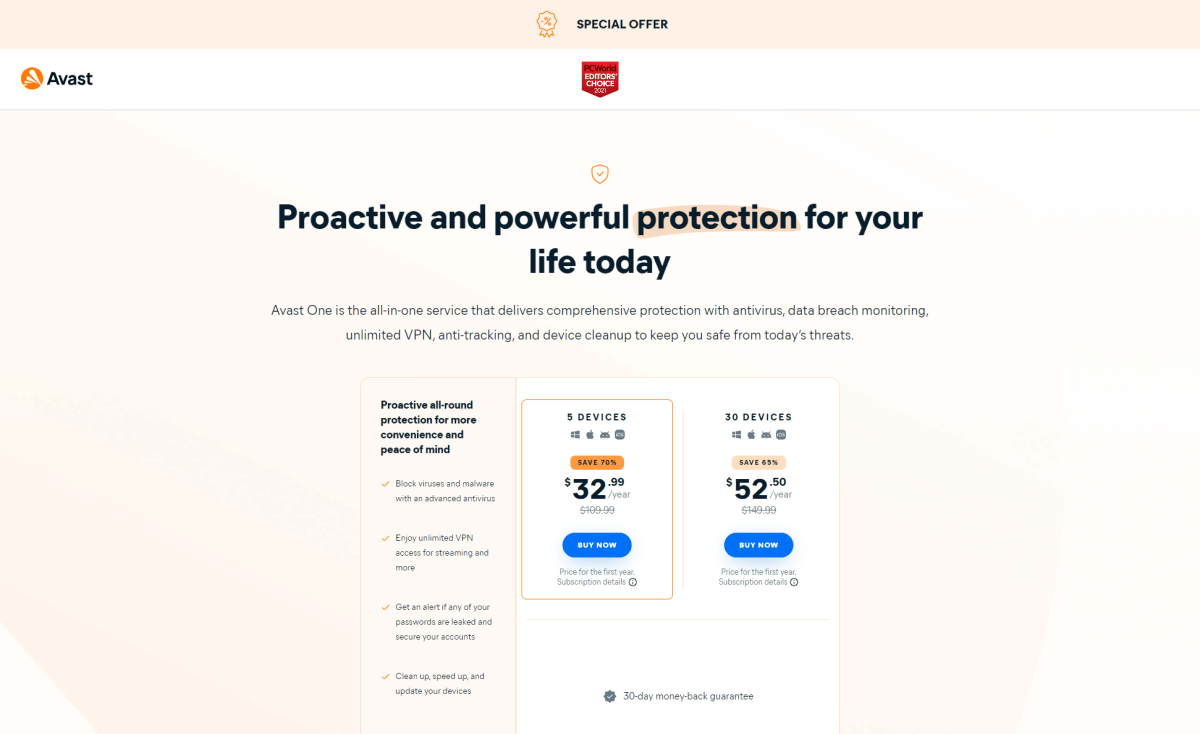
If you use our link, PCWorld readers get a special rate for Avast One plans on the Avast website.
PCWorld
You can install Avast One on PC, Android, macOS, and iOS devices. The Avast One Family plan also includes a Family Sharing feature — it allows you to invite other users with separate accounts to share in that bigger device limit.
Relative to Avast’s Premium Security plan, which has a similar number of features, you’ll pay less for Avast One in the first year (relative to the number of devices you have). However, Avast One is more expensive in subsequent years, when the cost rises to the full list price.
Key features of Avast One
Installation and user interface
After downloading Avast One from your online account dashboard and installing, you’ll see a screen asking to start a scan of your PC. You can choose to do so (which is recommended), or skip to access the app.
Avast One’s interface is light-themed, with a mix of cream, tan, and orange accents for its color theme. A simple navigation bar lives on the left side of the screen, giving quick access to the dashboard, features, notifications, and settings. The tabs aren’t labeled as clearly as in competing software — Account is where you’ll find settings and other app-related info, for example. But you can get oriented quickly, thanks to good descriptions within each section of the software.
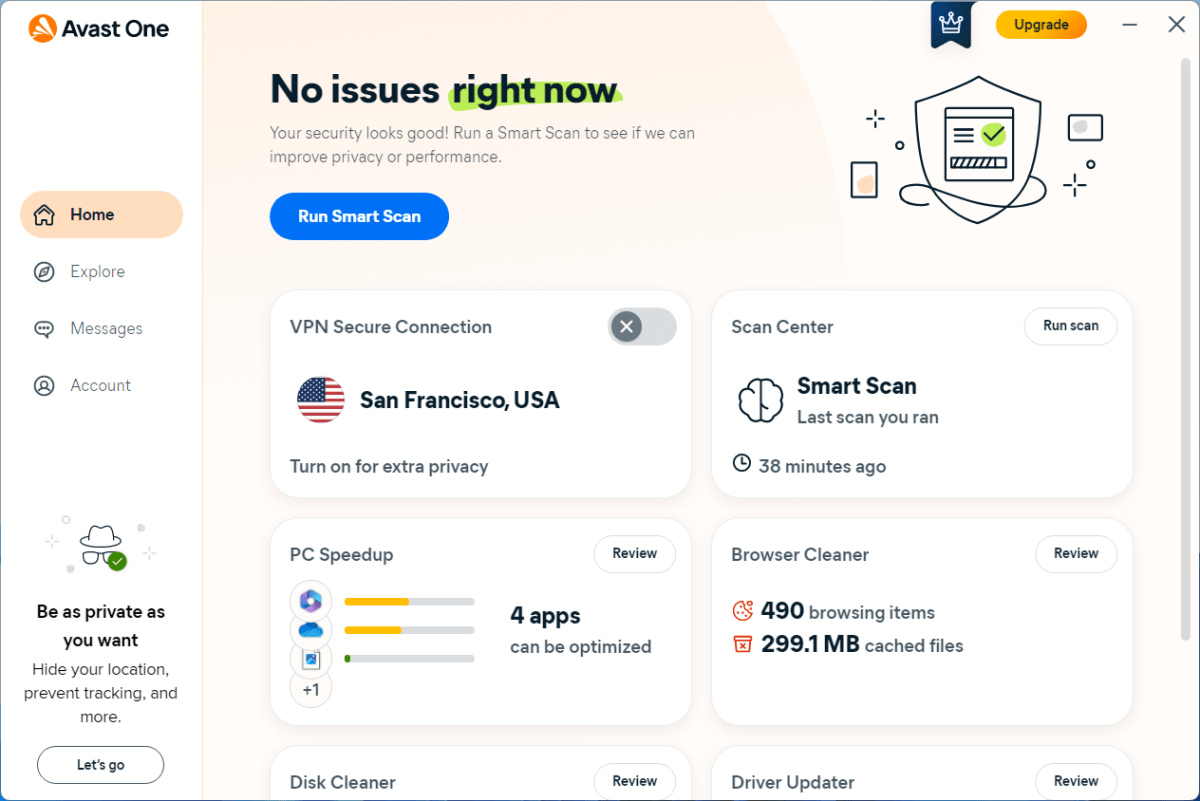
PCWorld
Opening the app will show the Home screen, which is a dashboard that lets you run a scan, turn on the VPN, or run one of several utilities. You have just two options for scanning here, a smart scan and a deep scan. For others, you must head to the Scan Center within the Explore tab, which houses all Avast One features. There you’ll find options for Targeted Scan and Boot-Time Scan in addition to the smart and deep scan defaults. You can also create a custom scan. But unlike Avast’s Premium Security suite, Avast One’s scan settings are more limited. In fact, this difference is how the two products diverge — Avast One focuses on a simpler experience geared toward life online, while Premium Security prioritizes greater control over security on your PC.
Some users may not like the list format of the Explore tab. Though it groups the different settings by type (Device Protection, Online Privacy, Smooth Performance), those who like to see everything on a screen at once may find it frustrating to have to scroll. But each entry is labeled clearly and described well.
Surprisingly, Avast One’s attempt to upsell its more premium plans is a fairly discreet button at the top of the window, next to the minimize and exit buttons. It’s far more subtle than the approach taken by Avast’s sister company, AVG.
Virus, malware, and threat protection
Real-time protection
Avast One keeps continuous watch for real-time threats, both online and on your PC. When you browse the web, the software scans pages for malware and watches for attempts to redirect you to fake sites. The traffic going to and from your PC also get screened for suspicious activity, as do attempts to access passwords saved to your browser. If you choose to give Avast access to your webmail account (like Gmail), it will also monitor your email for phishing scams and malware.
On your PC, Avast One scans files you add or open, checks downloaded email in Microsoft Outlook or Mozilla Thunderbird for malicious attachments, and limits access to folders often target by ransomware (and any others you add to the list). It also allows only approved apps to use your webcam.
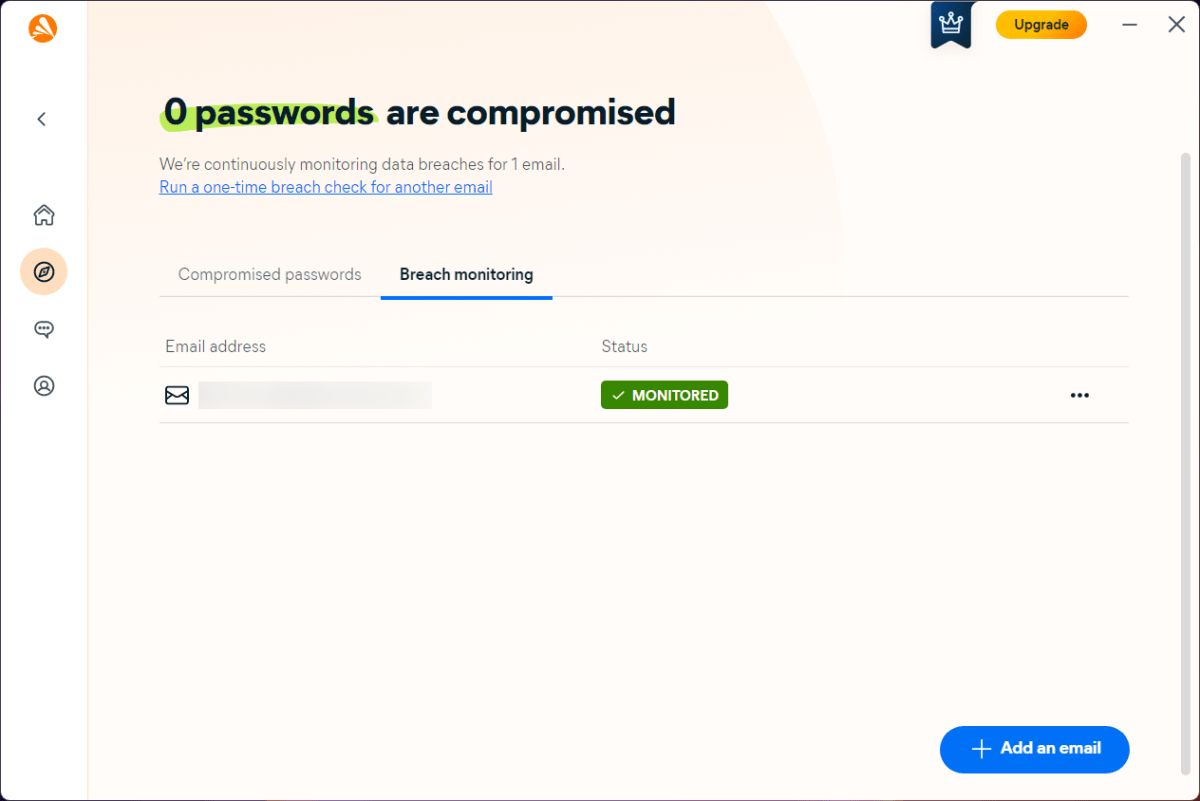
PCWorld
Avast One also tracks data breaches to see if any of your email addresses (up to five) have appeared in them. You’ll get notified whenever a match is found. Changing your password on that service or site — and any others where you might have also used it or a close variant — will be up to you to perform yourself, though. (Which is when a password manager comes in handy.)
Scheduled and manual scans
Unlike other antivirus software makers, Avast does not set up a default scheduled scan in a freshly installed app — and so Avast One lacks this feature out of the box (so to speak), too. It’s an odd move, since scheduled scans keep up the security of a PC with minimal user effort needed.
To get your PC on a regular scan schedule, you can click the Automated Smart Scan scheduling button in the Scan Center’s Scan Now tab. A smart scan checks for malware, vulnerabilities in your browser and apps, and other issues, in order to keep your PC clean overall.
Alternatively, you can create your own custom scan, which lets you pick from Deep Scan, Targeted Scan, or Quick Scan as your template. Deep scans dig thoroughly through your PC, while targeted scans examine specific files or folders. Quick scans look at commonly targeted and critical areas of your system. You can then further tweak a handful of advanced settings.
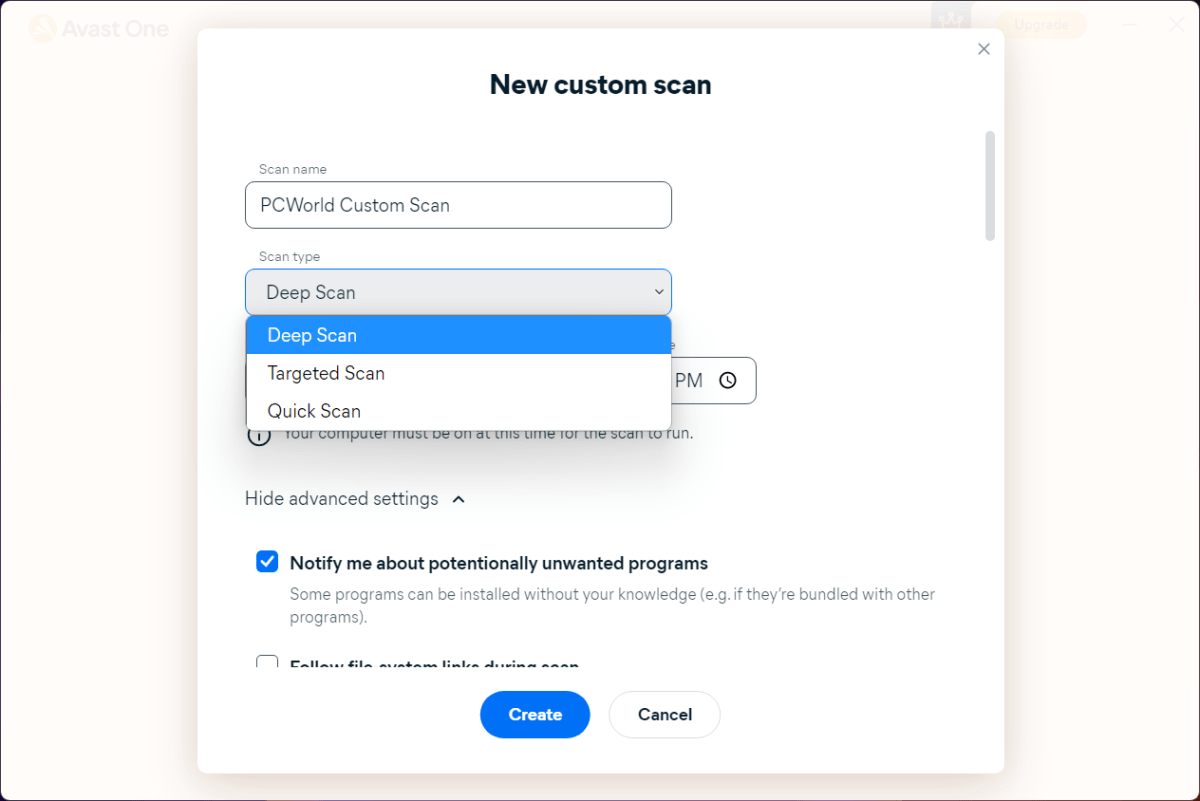
PCWorld
For both smart scan and custom scan scheduling, your options are to run the scan just once, daily, weekly, or monthly. Of the options, I recommend scheduling a quick scan or custom scan — they require no user input to complete. Smart scans ask for your input on findings for each portion of the scan before moving to the next piece.
If you prefer to manually run a scan, your options are Smart Scan, Deep Scan, Targeted Scan, Boot-Time Scan (which searches for any threats before Windows starts), and any of your custom scans. Unlike Avast’s Premium Security suite, you can only adjust your custom scan’s settings.
Firewall
Avast One’s firewall handles all traffic coming and going from your PC, completely replacing Windows own default protection. For most people, it will feel like an upgrade — the interface makes monitoring and controlling app access feel easy, rather than scary. You can clearly see which Windows programs and services are currently online and which have asked for access, as well as immediately block any suspicious items on the list.
(Windows may have come a long way with its security suite, but dig into its firewall settings, and you’ll see a mix of interfaces from different eras—and most of them are not friendly to a non-technical audience.)
The default settings are adequate for most people, though Avast One doesn’t allow much customization. You can add new apps, block apps or devices, and change three settings (two of which are related to notifications). But that covers the basics sufficiently.
Ransomware Shield
A common protection against ransomware, which encrypts files so that the attacker can extort money from victims, is to limit software access to folders often targeted by such malware. Untrusted apps can’t change or delete files in those locations. So even if you accidentally install ransomware on your system, you get an extra layer of defense.
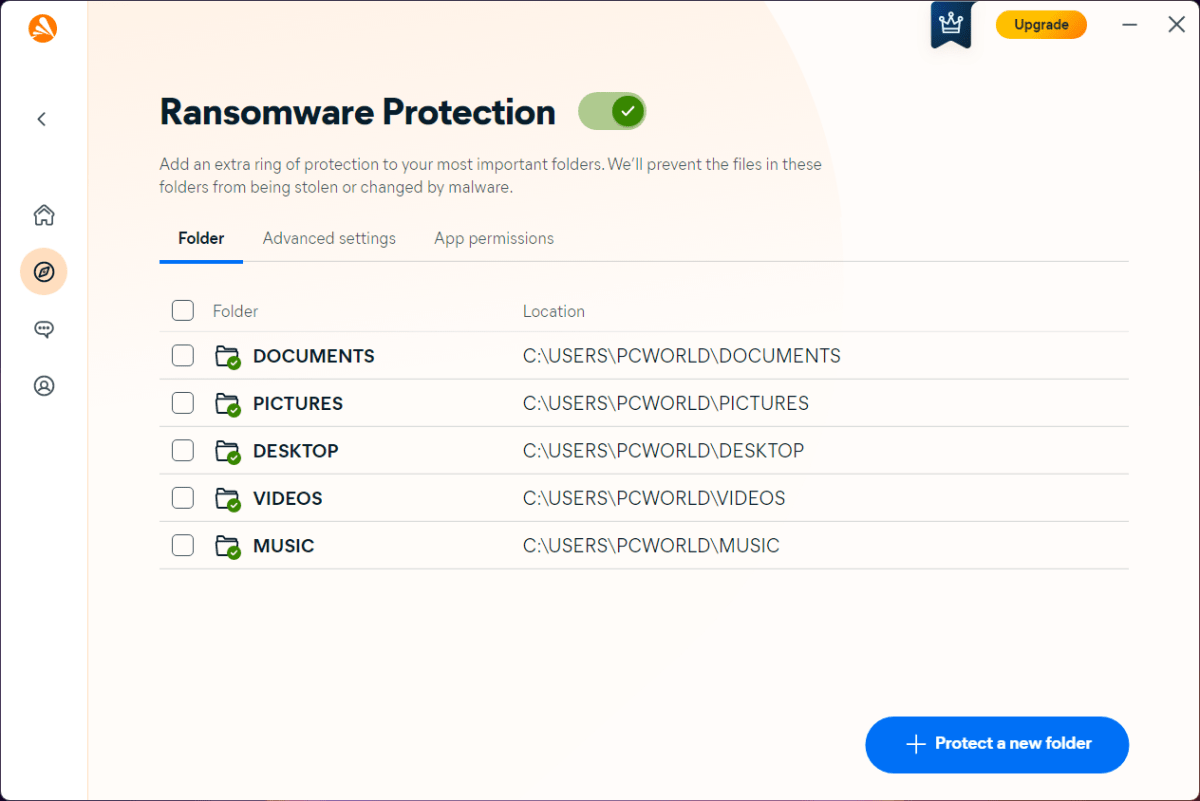
By default, Avast One protects select Windows folders from ransomware by limiting app access to them and certain file types within.
PCWorld
By default, Avast One monitors specific file types within your Documents, Pictures, Desktop, Videos, and Music folders, including documents, pictures, and videos. You can manually add more folders and file types (using file extensions like .tiff or .pdf) to the protected list. Well-known apps (e.g. Microsoft Word or Adobe Photoshop) automatically get access, but not any others.
For a stronger defense, you can change the settings to let only approved apps through, as well as wholesale protect all files within protected folders. But be aware these tighter restrictions can require intervention on your part to ensure apps like games still function normally.
Of course, for the best protection, you should still independently keep at least one current, offline copy of your files — like on an external drive you only connect to your PC when performing the backup. Your PC could fall to ransomware, but your data won’t be lost to you.
In addition to excellent malware protection, Avast One provides tools that simplify safeguarding your privacy and keeping your PC in tip-top shape
Additional features
Browser extensions
Avast One automatically screens and blocks malicious websites, but the optional Avast Online Security & Privacy extension can help you avoid clicking on bad links to begin with. Search results in Google and Bing get visual badges that indicate if a site is safe or not. They can be easy to miss at first, though, since the icons are smaller and more subtle.
The extension will also block trackers, several ad networks, and cookie permissions. In fact, it automatically requests only necessary cookies from sites. If you’re tired of pop-ups asking you for your cookie preferences, you’ll like the last feature. Having to manually install the extension becomes worth the effort.
Network Inspector
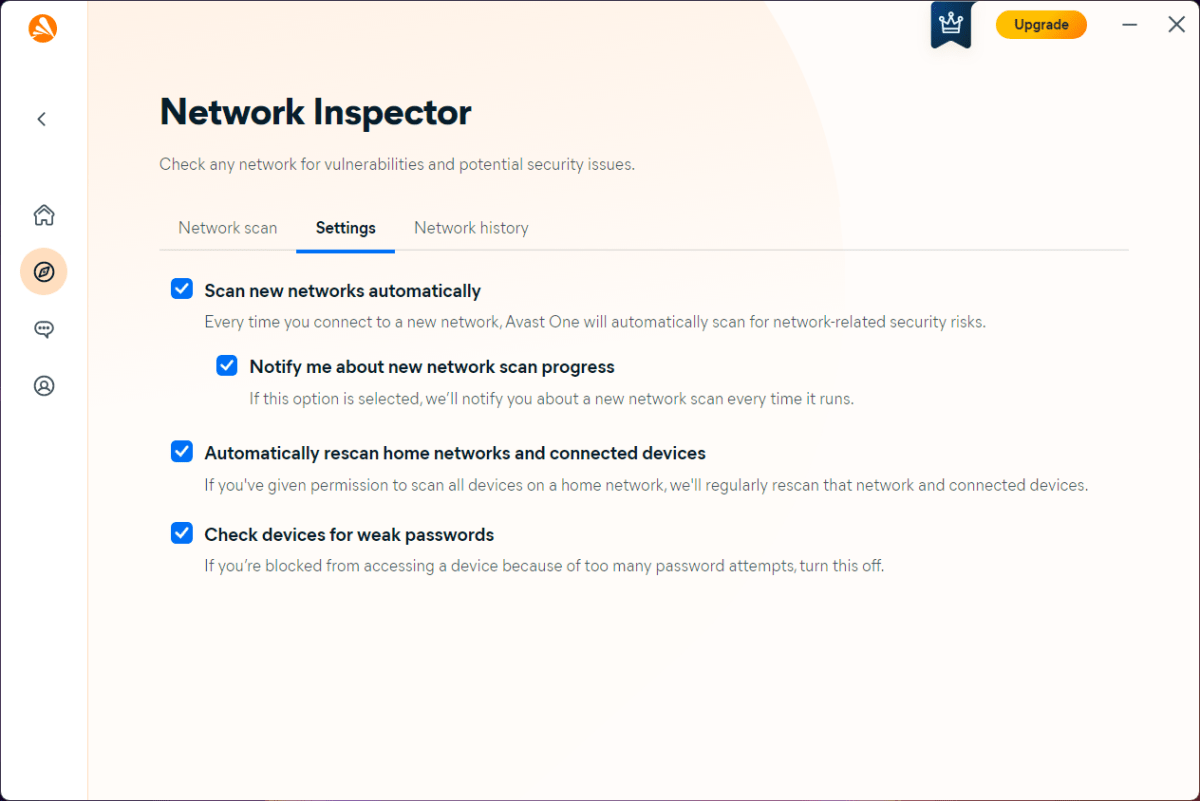
Avast One’s Network Inspector tool can be a good way to get verification that you’ve indeed done the basics to secure your home network.
PCWorld
Hopping onto a new network can expose you to vulnerabilities — an issue that Avast tries to solve with its Network Inspector feature. You run the scanner to look for potential threats lurking on the network you’re connected to, like DNS hijacking or a weak password on a router, or a vulnerable device.
This tool has limited utility, especially for public networks. To protect yourself on such connections, the answer is simple: Use the included VPN to maintain your security and privacy. For a private network that you trust (like the one you have at home), it can help you verify your router is configured with at least basic safeguards in place.
You can adjust the settings for automatic scanning and if devices are checked for weak passwords. You can also check to your connection history to see what networks you’ve recently used.
PC utilities (Disk Cleaner, Driver Updater, and Duplicate File Finder)
Avast One unlocks three additional utilities to help keep your PC running efficiently: Disk Cleaner, Driver Updater, and Duplicate File Finder.
Disk Cleaner and Driver Updater simplify tasks you can perform yourself in Windows. Disk Cleaner lets you dump temporary files, downloads, items in the Recycle Bin, broken shortcuts, and broken registry keys to free space on your PC. Driver Updater scans your PC for outdated drivers and handles updating any that are out of date.
Both have clean interfaces that are explained with clear, simple language, which is an improvement over poking around in Windows to do the same work. Disk Cleaner also lets you see exactly which temporary files are on the chopping block, and unselect specific categories to keep them around.
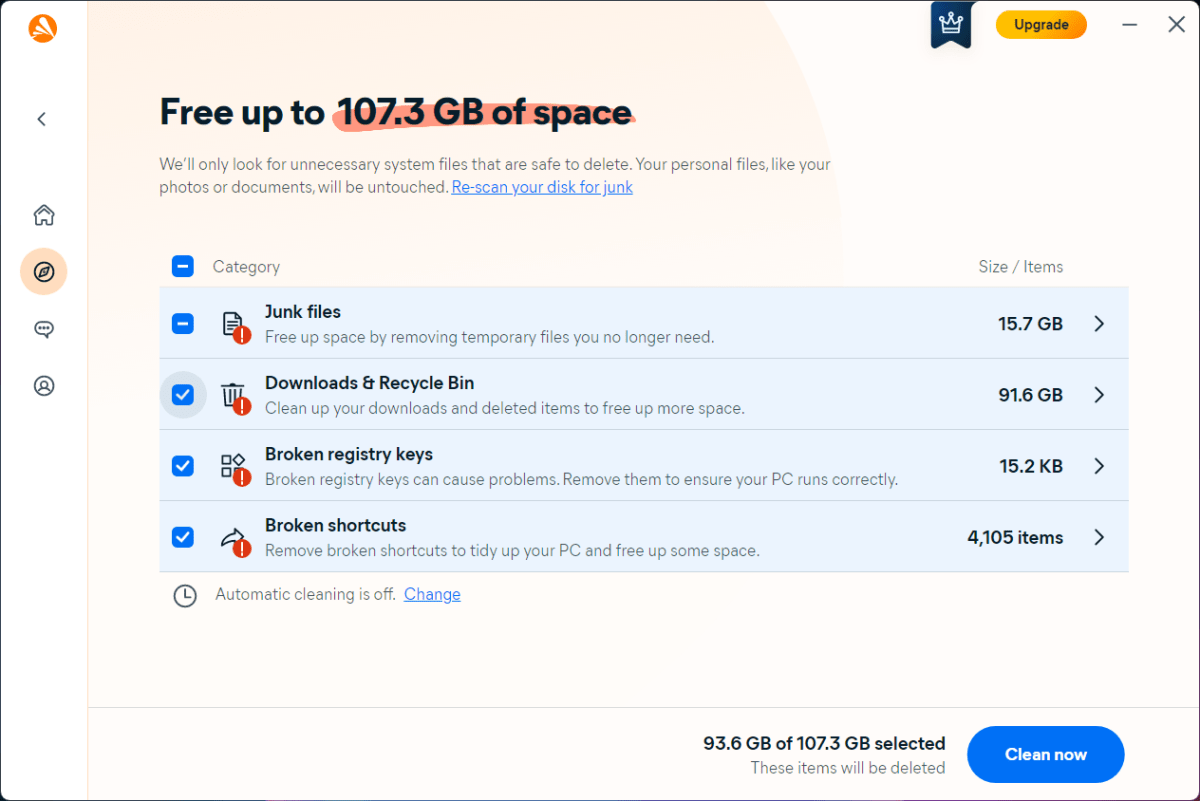
Avast One’s Disk Cleanup utility helps you purge temporary files from your PC — but its easy-to-use interface is a double-edged sword.
PCWorld
There’s just one downside to these two tools — how easy it is to use them. Disk Cleaner makes deleting elements from registry too quick and simple. Fiddling with your Windows registry can cause problems, so you should always understand what you’re changing; yet with Disk Cleaner, you can wipe parts of your registry without having to know where to dig and why. Similarly, updating a driver without knowing its source can also lead to later issues, though usually not as bad as a botched registry.
Happily, Duplicate File Finder gives no reason for concern. It performed surprisingly well in my light testing — the utility could tell the difference between files that were created separately but functionally the same, and actual copies with different names. Video files created as part of my Handbrake benchmarks are the same for real-world purposes, but the tool didn’t flag them. It did catch files I copied but renamed.
Sensitive Data Shield
Many people store files containing sensitive information on their computer, such as banking details, social security numbers, paycheck info, and even passwords — and that practice can become a liability if your computer is compromised.
(Side note: Storing passwords in a document on your PC is very insecure. Use a password manager with a database stored on your computer instead — it will encrypt the data and greatly strengthen your security.)
Avast tries to shield your PC from this threat with its Sensitive Data Shield feature. It scans your PC for documents for common types of private information, then restricts access to the list of the files found. Malicious apps won’t be able to discover and extract that data. You can manually flag additional files for protection, as well as allow or block specific apps.
The feature has limited effectiveness, though. The scanner doesn’t always catch every file with sensitive info — and it only looks for .pdf, .doc, .docx, .xls, and .xlsx files. You can’t manually add files of other types, either.
VPN
Accessing Avast One’s VPN is most easily done through the main dashboard, where you can instantly flip on a connection to the preselected server. You can also tap the tile to jump to the VPN Secure Connection screen, which lets you adjust a handful of settings.
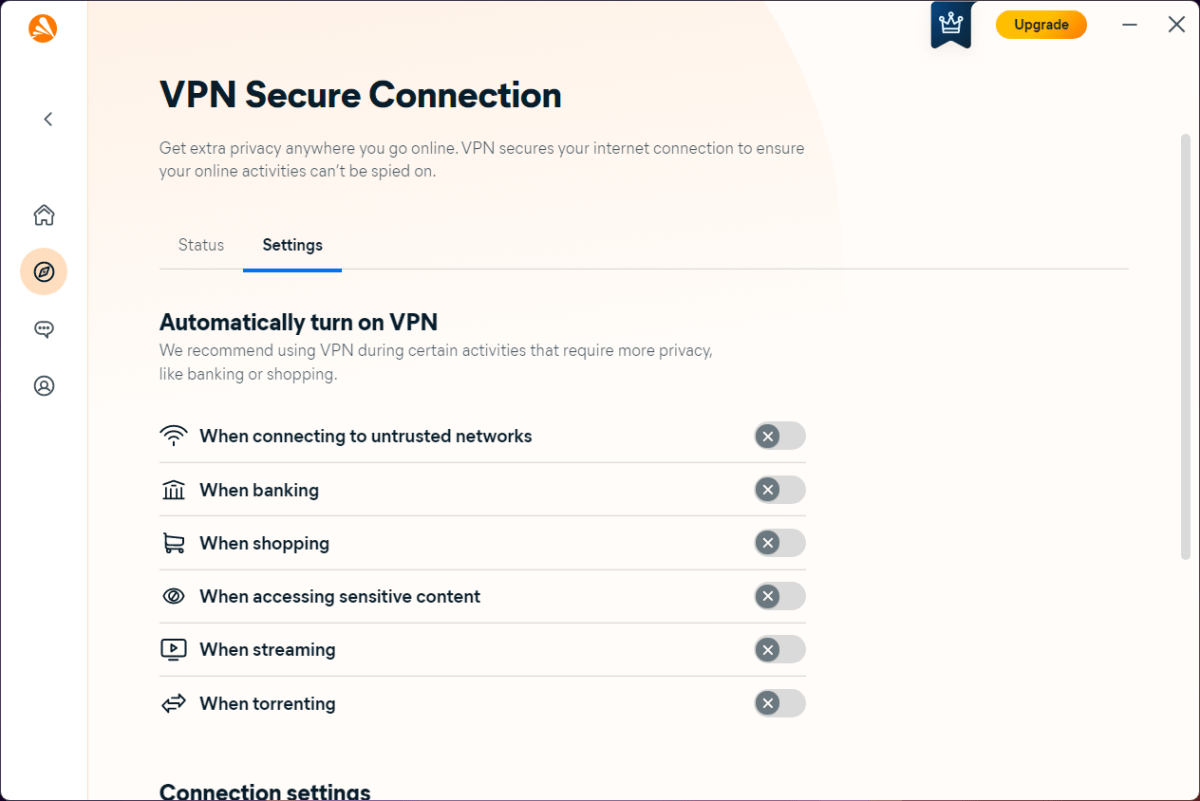
Avast One gives more granular control over automatic connection of the VPN when compared to some rivals.
PCWorld
If you choose the latter option, you can turn the VPN on and off, select a specific server, and change the connection settings. The VPN can be configured to automatically activate in certain scenarios, like when on an untrusted network (e.g., public Wi-Fi), a banking website, streaming, or shopping. It also supports peer-to-peer connections.
Additionally, you can toggle whether Avast sends autoconnection notifications, kills all internet traffic if the VPN accidentally disconnects while active, and allows your PC to see local devices (like printers) when the VPN is on. The first two features are enabled by default, while the latter is disabled.
Avast offers servers in 37 countries, which span Australia, Austria, Belgium, Brazil, Canada, Czech Republic, Denmark, Finland, France, Germany, Hungary, Iceland, Ireland, Israel, Italy, Japan, Latvia, Lithuania, Luxembourg, Malaysia, Mexico, Netherlands, New Zealand, Norway, Poland, Portugal, Republic of Singapore, South Africa, South Korea, Spain, Sweden, Switzerland, Taiwan, Turkey, UK, Ukraine, and the USA. You can choose a specific city for five countries (Australia, Canada, Germany, Spain, UK, and the USA).
Customer support
If you have questions about Avast One, you can use Avast’s support website or help forums to find answers. Customer service is also available by phone, email, or chat. The support website is the best place to start with for basic questions — there’s even a helpful user guide if you want to get properly acquainted with the software.
Updates and maintenance
Avast One automatically updates its virus definitions and the app itself in the background by default — you don’t have to check on it. However, you can change these settings so that you only get notified when updates are available, or go for complete manual control (not advisable). You can also manually check for updates in the app settings (Account > Settings > General).
Performance
Avast’s antivirus engine generally performs well in tests conducted by leading security research institutions. It detected 100 percent of the threats in AV-Test’s zero-day attack and malware evaluation for July and August 2024 (the most current results released). All 17,663 samples for recently discovered and widespread malware and 302 samples for zero-day attacks were blocked.

AV-Comparatives’ real-world test results for July and August 2024.
AV-Comparatives
In AV-Comparatives’ real-world protection test for July and August 2024, Avast also blocked 99.6 percent of the 237 test cases, with just 13 false positives. Its engine should notice and catch malicious web links, exploits (like ), and URLs that direct you to malware.
Avast also performed almost as well in AV-Comparatives’ September 2024 malware protection test, with a strong 99.93 percent online protection and 95.8 percent online detection rate. Its offline detection rate ranked near the top, coming in at 94.3 percent with four false positives.
For more sophisticated, targeted threats, Avast still has room to improve. It caught 12 of the 15 test cases in AV-Comparatives’ October 2024 Advanced Threat Protection Test, which involves threats like fileless attacks and malicious scripts. However, Avast caught test cases that higher performing rivals missed, suggesting that antivirus vendors are all still strengthening their protection in this area.

AV-Comparatives’ malware test results for September 2024.
AV-Comparatives
In daily use, expect Avast to have minimal impact on system resources during most typical tasks, especially when left idle in the background. When I ran PCMark 10’s Extended benchmark, which simulates web browsing, video chatting, gaming, and image and document editing in free, open-source apps, the scores remained the same as before installing Avast One. The software also had little effect on our Handbrake encoding test, which transforms a large, uncompressed video file into a smaller, compressed version. When running a deep scan continuously in the background, performance dipped by about 10 percent for both benchmarks — a modest amount compared to competitors.
The one exception to this behavior is when working on Microsoft Word, Excel, and PowerPoint documents. Avast was aggressive during in its scans when I ran UL Procyon’s Office Productivity benchmark, which focuses on Microsoft Office use. When Avast One was idle in the background, scores dropped by about 11 percent when idle. They fell by 25 percent when a deep scan was run continuously.
In the real world, these results suggest heavy Microsoft Office users on slower PCs should be strategic about the timing of scans. A full system scan scheduled for off-hours (like when you’re asleep) won’t interfere with getting work done. During active hours, you could see some performance effects when in Office apps, but not as notably.
Should you buy Avast One?
Avast One provides strong, broad defense against online threats, with features that make an upgrade from the free version (or Microsoft Defender) worthwhile. In addition to excellent malware protection, it provides tools that simplify safeguarding your privacy and keeping your PC in tip-top shape — and the interface for managing everything is clean and simple, to boot. This security suite does lack a password manager and parental controls, but if you’re set on those fronts, this app’s polish is hard to beat.
Editor’s note: Because online services are often iterative, gaining new features and performance improvements over time, this review is subject to change in order to accurately reflect the current state of the service. We’ve most recently updated it to include up-to-date protection result details.

